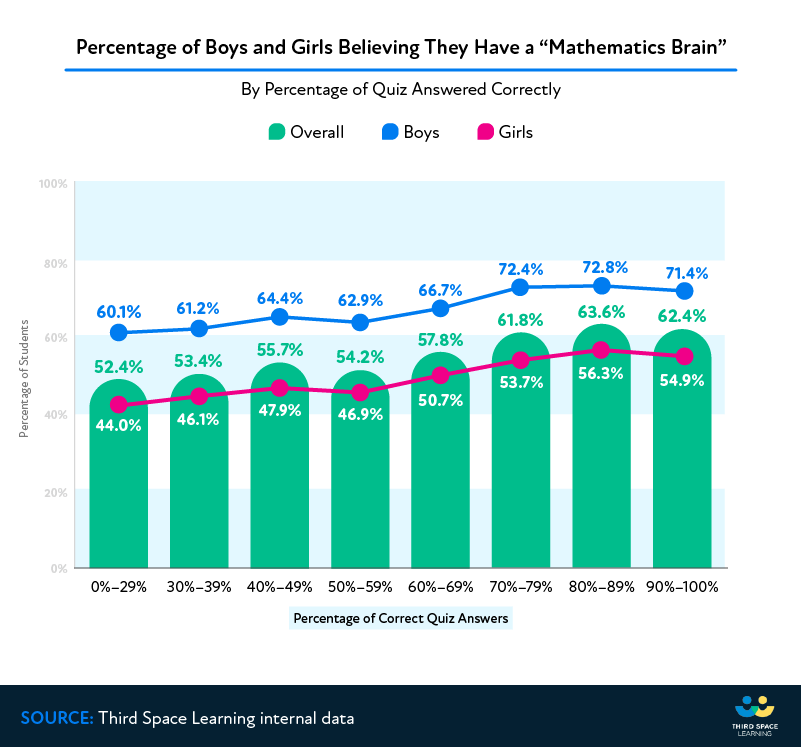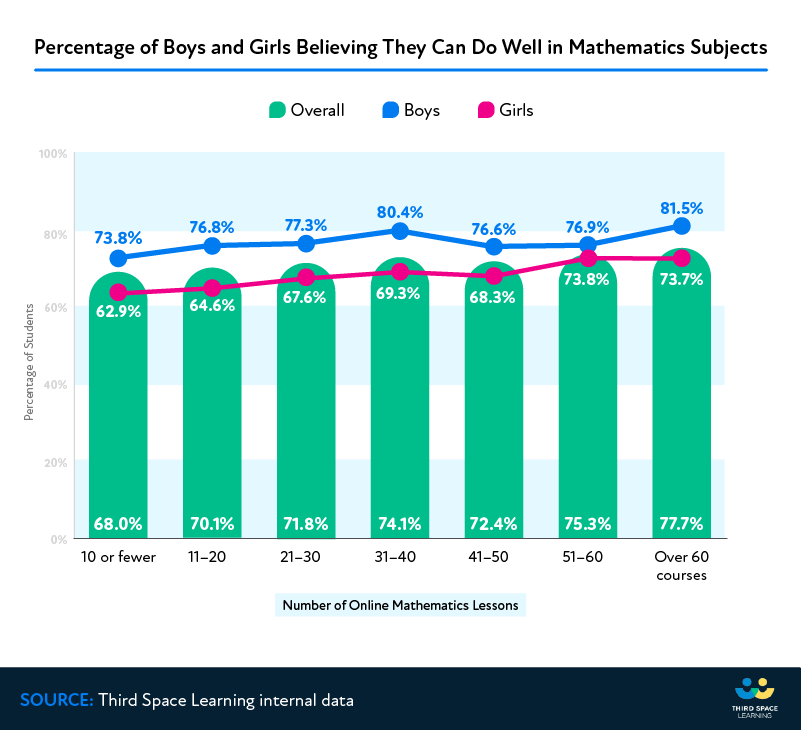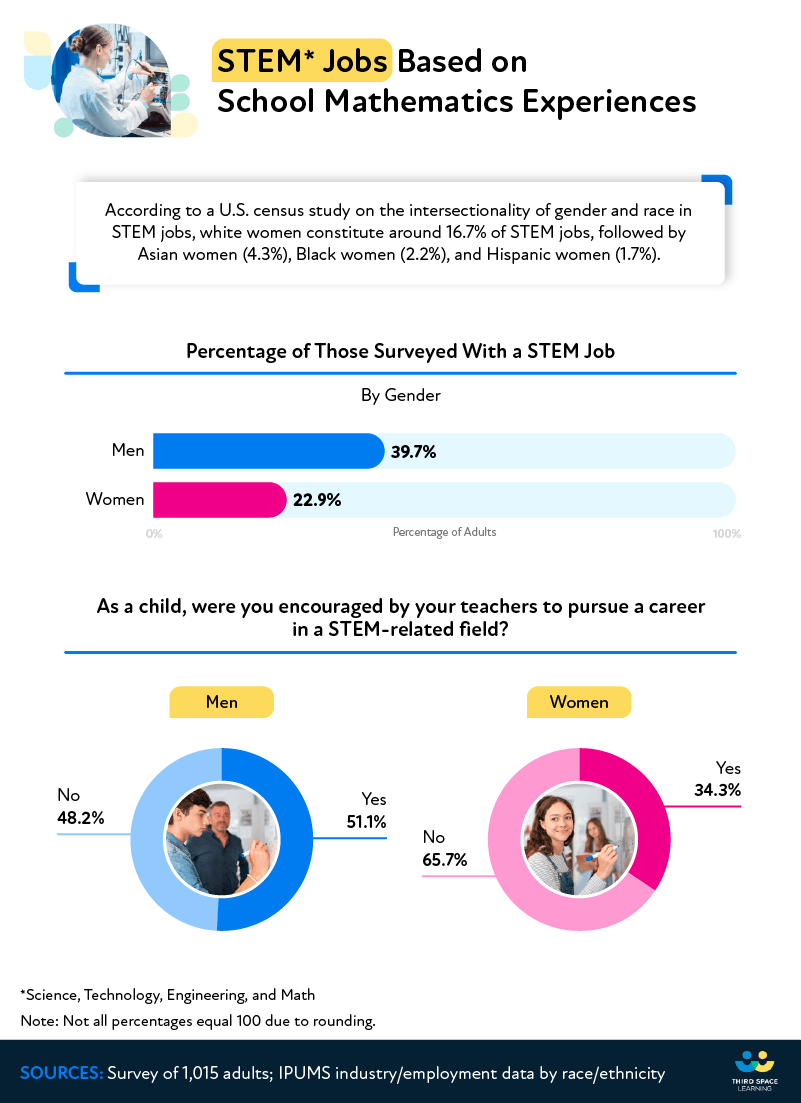
Careers in STEM-based fields and occupations (that’s science, technology, engineering, and mathematics) consistently rank among the most lucrative and in-demand job opportunities, yet the field continues to be dominated by men. STEM education is inherently mathematics-intensive, and girls and women are statistically less likely to pursue careers and education in mathematics-heavy fields. However, our study shows that it is not competence but a relative lack of confidence and fewer role models that may be getting in the way of women’s further achievements in mathematics.
We wanted to explore adult and student experiences with mathematics subjects in order to get a closer understanding of why this mathematics gender gap exists and its impacts. We surveyed over 1,000 adults – men and women – from the U.S. and UK about their feelings toward mathematics as students, as well as how they performed in various mathematics classes. We also asked them about their employment and whether or not they were encouraged to pursue STEM-related fields. Next, we analyzed Third Space Learning’s internal data, which allowed us to explore the anonymous responses of young students on their feelings toward mathematics, their confidence in their abilities, and their performances on independent quizzes taken after each online maths lesson. Read on to explore the findings and takeaways highlighting the pervasive gender gap in mathematics.
“Mathematics People”: Perception vs. Reality
To start, we asked over 1,000 adults to reflect on their feelings toward mathematics and found that men were more likely to believe themselves to have an aptitude for mathematics than women. Additionally, men were more likely to describe themselves as “excellent” or “good” students in terms of performance, while women were more likely to rate themselves “average” or even “poor.”

Actually, at the top end of the range there were almost equal numbers of women who would describe themselves as “excellent” mathematics students as there were “excellent” male mathematics students.
It is in their confidence levels that men and women really differ with nearly a 10 percentage point difference in confidence levels!
Mentorship can play an important role in developing confidence in a young student, and a significant number of women surveyed reported little to no mentorship or support to succeed in STEM-related fields (46%). In contrast, fewer men (40%) reported experiencing a similar lack of support or mentorship. While the gulf between the two percentages is not extreme, it is still significant enough to have a tangible impact on the perception girls and women have with regard to their access to the areas of mathematics and science.
This relative lack of support likely also contributes to the level of enjoyment reported between men and women. It is striking that nearly 40% of male respondents cited favorable feelings toward mathematics, compared to only 27% of women. In the next set of data points, we analyze that sentiment among young mathematics students.
External Factors That Perpetuate Girls’ Lack of Confidence in Mathematics
When we analyzed Third Space Learning’s internal data, including 47,000 pupil responses categorized by gender, we found that boys and girls report enjoying mathematics at a mostly equal level, but boys are much more confident in their abilities than girls. There is also a visible decrease in confidence in mathematics as children get older, as seen by comparing the 40% of adults who felt confident about their abilities to the 70% of children who felt confident.

This gap in confidence and perceived ability between men and women begins while in school. Of the girls who scored between 90% to 100% correctly on mathematics quizzes, only about half responded as believing they have a “mathematics brain.” In contrast, 60% of boys who scored between 0% and 30% on the same quizzes reported an equal level of confidence in having a “mathematics brain.” The irony is that, of the students we studied, girls performed better than boys overall.

As students – girls especially – attend online maths tuition sessions, their confidence in their ability rises and continues to increase the more online tutoring and targeted maths intervention they receive. Additionally, the confidence gap between boys and girls receiving mathematics tuition is much smaller than those solely studying mathematics in class. And the more sessions the students receive, the smaller the gap.

While their belief in their own mathematics abilities increases with experience, female students are still confronting the troubling theory that part of the reason girls may feel less confident in mathematics – and within STEM fields in general – is due to a lack of visibility of prominent women working in tech, engineering, and other relevant occupations. In an article for Forbes.com, General Manager of Publishing for Xbox, Shannon Loftis, laments the seemingly happenstance nature of her entering the STEM field: “I wish I had more awareness of my female predecessors prior to entering college. I feel like I stumbled into the [STEM] field. I can’t imagine this ‘lucky streak’ is common as a path to a career in STEM.”
Taking on the Mathematics Gender Gap
The numbers seem to strongly corroborate the fact that a lack of role models and encouragement among children to pursue STEM affects future career choices. When we analyzed the group of women from our survey who currently hold jobs in STEM fields, 77% of them said they were encouraged by a teacher or mentor to pursue their current path. Conversely, of the women who did not hold jobs within the field, only 21% reported ever being encouraged to pursue STEM. Broken down by ethnicity, even fewer women of color pursue STEM than the already small percentage of white women.

Research shows that the stereotype of girls and women not having “mathematics brains” or being cut out for roles within STEM occupations is not only completely without merit but that the mathematical ability of girls often meets or exceeds that of boys, even though those same boys would likely report a higher confidence in their abilities than girls.
Though the idea that girls’ mathematical abilities are inferior is a societal misconception, the ramifications of this stereotype are very real. This is proven by the gender gap of STEM-based occupational pursuit, with only around 23% of women polled reporting an occupation in STEM. With an increased focus on providing access to resources, such as tutoring and mentorship, for girls interested in mathematics and in pursuing STEM-related fields, we may be able to close that gap and dispel the false notion that girls’ brains are any less cut out for these important, historically male-dominated roles.
Girls and women with an interest and aptitude for mathematics, regardless of the outdated stigma and perception about who belongs in STEM occupations, are incredibly valuable to STEM fields and to the future generations of girls who will grow up to excel within them. Third Space Learning is dedicated to closing the mathematics skills gap and improving outcomes for girls and boys by providing focused, affordable one-to-one tuition in mathematics with proven results, including addressing misconceptions held by students. Third Space Learning utilizes comprehensive, flexible strategies for a wide range of ages and abilities, including hundreds of primary maths resources and GCSE maths revision resources, worksheets and lesson plans available on the Third Space Maths hub. Visit thirdspacelearning.com for more information about our offerings, funding including through pupil premium and our partnership with the National Tutoring Programme and
Methodology
We surveyed 1,015 adults from the UK and U.S. on their feelings toward mathematics as a child. We also asked them about their job outcomes, whether they were encouraged to pursue STEM careers, and how they felt they performed in mathematics during high school or secondary school. 49% of our respondents were women, and 50% were men, with less than 1% identifying as nonbinary. Data was not weighted, and survey data has limitations due to self-reporting issues that include, but are not limited to, telescoping, exaggeration, and selective memory.
We used Third Space Learning’s internal data to analyze over 47,000 pupil responses to several different questions gauging their sentiment toward the subject of mathematics. We also used their post-session assessment answers in order to find average performance levels and ranges for analysis. We grouped the number of sessions pupils had taken in order to compare variables like confidence with experience.
Fair Use Statement
If you’ve found our research on boys’ and girls’ perceptions and confidence in mathematics skills useful, you are welcome to share our data for non-commercial purposes. Please link back to our study to ensure we receive proper credit.